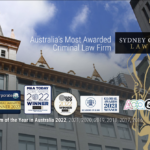Australia’s Treatment of Asylum Seekers: Crime Against Humanity?

Australia has its own criminal laws, both at a state and federal level, but we are also a signatory to the treaty which established the International Court of Criminal Justice (ICC) in 2002.
What does the ICC do?
A total of twenty-two cases and nine situations have been brought before the ICC.
The Court was set up to ensure that serious crimes affecting large numbers of people could be dealt with at an international level, including those crimes committed by governments.
Among other things, the Court investigates and prosecutes crimes such as genocide, war crimes and crimes against humanity.
The ICC is overseen by a president who is responsible for overseeing its prosecutions and day-to-day operations.
The current president is Judge Silvia Alejandra Fernandez de Gurmendi, from Argentina.
There are a total of eighteen judges, who are elected by member states, as are the prosecutor and deputy-prosecutor.
The Office of the Prosecutor investigates and prosecutes international crimes that have been committed since 2002, the year the court commenced operation.
The prosecutor can investigate cases referred to them by a member country, or complaints made by individuals or organisations.
Australian and the ICC
Australia is party to the Rome Statute, which was the international instrument used to bring the ICC into being.
Consequently, Australia is required to co-operate with investigations and prosecutions undertaken by the court.
But international treaties and conventions do not automatically take the force of law in Australia.
In order for the Rome Statute to become part of Australian law, domestic legislation had to be enacted.
The International Criminal Court Act 2002 (Commonwealth) outlines how Australia is required to comply with requests for co-operation from the ICC.
Last year, independent federal MP Andrew Wilkie requested that Tony Abbott be investigated in relation to his treatment of refugees, alleging that Federal policies constitute crimes against humanity.
He stated that the Abbott government has violated a number of other international agreements as well, including the Refugee Convention and the UN Convention on the Rights of the Child.
“the government is pandering to racism, xenophobia and selfishness instead of acting like leaders… if they won’t listen to the swathe of community outrage, then hopefully they’ll listen to the International Criminal Court.”
Wilkie’s views were condemned by the Liberal party, who called his referral to the ICC “embarrassing.”
Members of the Liberal party contended that:
1. There is no basis for the allegation of crimes against humanity, and
2. As a sovereign country, Australia should not put up with foreign interferences.
Australia has developed a reputation of being notoriously reluctant to accept the binding effect of international instruments, even after they have been incorporated into Australian law.
Before calls for Abbott to face the ICC were made, his predecessor John Howard was also referred to the ICC, accused of genocide, crimes against humanity and war crimes.
This was based on the decision for Australia to intervene in Iraq back in 2003, but those who made the complaint are still waiting for a response.
So far, Australia has never been the subject of an ICC investigation or prosecution.
And even assuming the ICC decided to investigate Abbott or Howard, the government could simply quash any hope of a prosecution by refusing to concede that the ICC had jurisdiction, and refusing to allow officials to appear for trial in the Hague.
Like many international law instruments, the ICC’s enforcement mechanisms are said to be lacking when it comes to prosecuting leaders of ‘developed’ countries.
It is therefore unlikely that any Australian politicians will be appearing before the Court anytime soon.
Receive all of our articles weekly
Author






